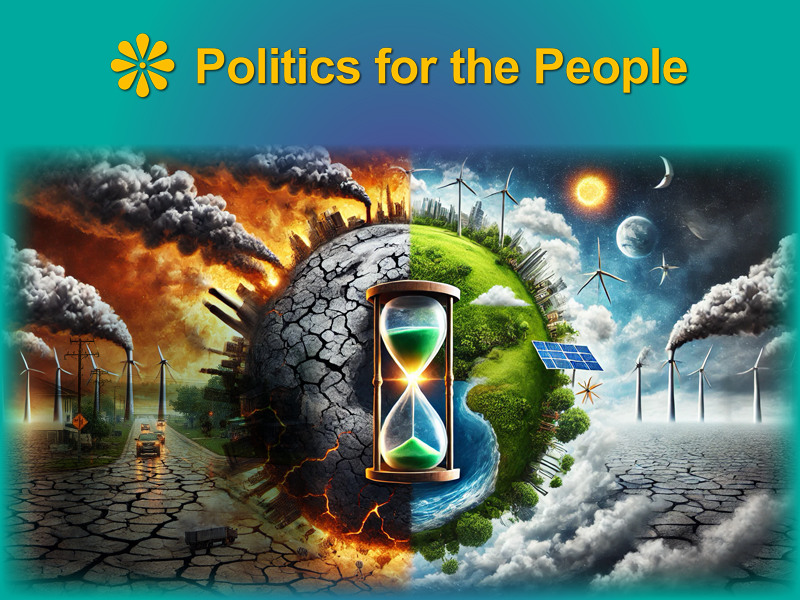Introduction: The Urgent Need to Address Climate Change
Climate change is still one of the greatest challenges facing humanity, with its impacts touching every aspect of our lives. From severe weather patterns disrupting millions to a global decline in biodiversity and increasing public health crises, the evidence of climate change is undeniable. Despite the scientific community’s consensus on the urgent need for action, responses have been hampered by a combination of political inertia, economic interests, and misinformation. This article delves into the consequences of climate change, the role of governments and investors, and the essential steps needed to forge a sustainable future.
The Crucial Role of Addressing Climate Change
The Environmental and Social Repercussions of Global Warming

The Earth’s rising temperatures, fuelled by human activities such as the burning of fossil fuels and rampant deforestation, have set off a domino effect of environmental crises. Key among these are the melting of polar ice caps and glaciers, contributing to rising sea levels that threaten to submerge coastal cities and create millions of climate refugees. Furthermore, the increase in global temperatures has led to more frequent and severe weather events like hurricanes, floods, and droughts, disrupting lives and livelihoods worldwide. On a social level, these changes have heightened food insecurity as agricultural patterns shift, threatening staple crops and the livelihoods of millions of farmers.
Biodiversity and Public Health at Risk
As habitats are destroyed or altered at unprecedented rates, countless species face the threat of extinction, reducing biodiversity and disrupting ecosystems that humans rely on for food, clean water, and disease regulation. Moreover, climate change worsens public health problems—heatwaves intensify respiratory and cardiovascular diseases, and changing weather patterns expand the range and season of infectious diseases like malaria.
Government Inaction and Accountability
Economic Priorities Over Environmental Health
Despite the clear warnings from the scientific community, many governments have continued to prioritize immediate economic gains over long-term environmental sustainability. This is clear in the continued subsidies for fossil fuel industries, reluctance to enforce stringent pollution controls, and slow adoption of renewable energy technologies. The influence of powerful corporate lobbyists further complicates political action, making it difficult to pass legislation that counters the interests of well-established fossil fuel sectors.
The Need for Transparent and Responsible Governance
To combat climate change effectively, governments must embrace transparency and accountability in their environmental policies. This means not only setting ambitious carbon reduction targets but also meeting these goals through enforceable and well-funded strategies. Policies should encourage innovation in sustainable technologies and foster global cooperation to ensure a cohesive response to climate change.
The Impact of Investor Decisions on the Environment
The Dilemma of Profit Versus Sustainability
The financial sector has a dual role in the climate crisis. On one hand, global investments in fossil fuels continue to drive significant emissions of greenhouse gases. On the other, there is a growing recognition of the financial risks associated with climate change, leading more investors to consider sustainability as a critical factor in their decision-making processes. The challenge lies in shifting the focus from short-term profits to long-term environmental sustainability.
Shifting Investment Towards Sustainable Practices
For meaningful progress against climate change, the financial industry must prioritize investments in renewable energy and other sustainable business practices. This involves divesting from companies that contribute heavily to environmental degradation and supporting those committed to reducing their carbon footprint. Such actions not only help mitigate the impact of climate change but also signal a market shift that can encourage more companies to adopt sustainable practices.
Conclusion: A Unified Call to Action
The fight against climate change is a collective endeavour that requires urgent action from all sectors of society. Governments must prioritize the health of the planet over narrow economic interests, and investors should support sustainable practices that ensure long-term environmental health. Each of us has a role to play, whether by advocating for stronger policies, supporting sustainable businesses, or making personal choices that reduce our environmental impact.
Engage and Take Action
1. How can we as individuals influence governmental and corporate policies towards better climate practices?
2. What steps can you take to support sustainable investments in your community?
Share This Article
Please share this article with your contacts and on social media to help spread awareness and inspire action on climate change.
References:
How do we know climate change is real? https://climate.nasa.gov/evidence/
Fossil fuels and climate change: the facts: https://www.clientearth.org/latest/latest-updates/stories/fossil-fuels-and-climate-change-the-facts/
What are the sources of Australia’s greenhouse gases? https://www.csiro.au/en/research/environmental-impacts/climate-change/climate-change-qa/sources-of-co2
Climate of the Nation 2021: https://australiainstitute.org.au/wp-content/uploads/2021/10/211013-Climate-of-the-Nation-2021-WEB.pdf
Climate Action Tracker Australia: https://climateactiontracker.org/countries/australia/
New global climate ranking sees Australia go from “dead last to far from a pass”: https://www.climatecouncil.org.au/resources/new-global-climate-ranking-sees-australia-go-from-dead-last-to-far-from-pass/
A beginner’s guide to fossil fuel divestment: https://www.theguardian.com/environment/2015/jun/23/a-beginners-guide-to-fossil-fuel-divestment
The Elephant in the room: Why Australian politicians don’t care about climate change: https://www.futuresuper.com.au/blog/the-elephant-in-the-room-why-australian-politicians-dont-care-about-climate-change/

